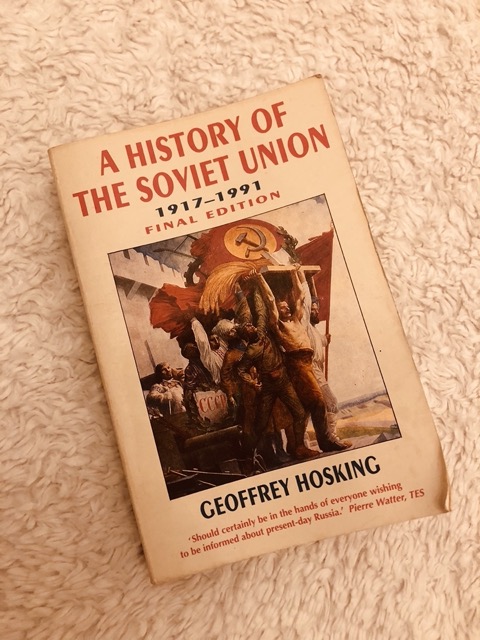I recently read ‘A History of the Soviet Union’ by Professor Geoffrey Hosking- which is a comprehensive overview of the Soviet Union from 1917-91. I read it mainly because I study a component on the Soviet Union as part of my A-level history course and I wanted to learn more about the wider impact of the leaders and policies that I’ve been studying on Soviet society at large. Despite the immense length and density of Hosking’s book, it met my needs absolutely. Hosking gives a detailed account of the history of the USSR and supplements this with in depth analysis of the wider effects of the Soviet regime on ordinary citizens.
Hosking covers the history of the Soviet Union from its founding in 1917 to its downfall in 1991- firstly covering the premiership of Vladimir Lenin, who oversaw the October Revolution, War Communism and the beginning of the New Economic Policy (NEP). The book then goes on examine the brutal dictatorship of Joseph Stalin, who brought the NEP to an end and ushered in a new era of collectivisation and mass industrialisation, accompanied by a totalitarian system of repression and coercion that eventually led to the Great Terror in the mid-to-late 1930s. Hosking analyses the Terror, Stalinist society and religion and nationality in the Soviet Union in depth before moving on to World War II- where the USSR successfully defended itself from German invasion despite huge deaths and casualties and ineffective war strategy from above. The book then looks at the last years of Stalin in the late 1940s and early 1950s before examining the Khrushchev period. Hosking specifically looks at Khrushchev’s approach to de-Stalinisation and to what extent he wanted to continue/discontinue Stalin’s policies, particularly those relating to the Terror, the NKVD (secret police) and cultural repression. Coming towards the end of the book, Hosking looks at Soviet society under ‘Developed Socialism’ and the premiership of Leonid Brezhnev- analysing the Kosygin reforms, the Prague Spring and the Brezhnev Doctrine as well as the political, economic and social decline of the Soviet Union in the late 1970s and early 1980s. In the penultimate chapter, Hosking looks at religion, nationality and dissent in the latter stages of the USSR- looking at the various policies employed by Khrushchev and Brezhnev to deal with dissent against socialism, rebellions from the republics and satellite states and religion. Lastly, the book analyses the reasons for the fall of the Soviet Union in 1991 and the roles played by the likes of Boris Yeltsin and Mikhail Gorbachev in the collapse- including the key Gorbachev policies of Glasnost and Perestroika.
What I found particularly interesting and useful about Hosking’s book was the focus put onto exploring the effects of the various Soviet leaders and their policies on ordinary citizens. Hosking doesn’t just look at the effects on Russian people but also on Ukranians, Estonians, Lithuanians, Latvians, Georgians, Armenians and Azerbaijanis. How the Communist Party treated the national identities, cultures and people of these countries is a heavily discussed topic in the book. Furthermore, Hosking explores the religious policies of the Soviet Union in detail- looking at what happened to Christians, Muslims and Jews in the USSR and how this treatment changed with the leaders. Consequently, I now have a wider and deeper understanding of the history of the Soviet Union than I did before reading this book as I now know about some of the real-life impacts of the leaders and policies I’ve learned about in A-level History.
Overall, ‘A History of the Soviet Union’ is a comprehensive retelling of the history by the experienced and knowlegeable Hosking. It is, however, a dense, hard to read and sometimes dry book and this should be kept in mind before getting it. In my opinion though, if you want to know more about the history of the USSR and like to read in-depth and detailed historical analysis, then it will provide incredible value in terms of understanding the period and its effects on people.






Well done Harry. This is a clear and informative review. It sounds as though you have gained a lot of useful supplementary information from this book which has extended and contextualised your understanding of the subject matter. I know it was rather tough going at times to get through it, but I am glad you persevered.